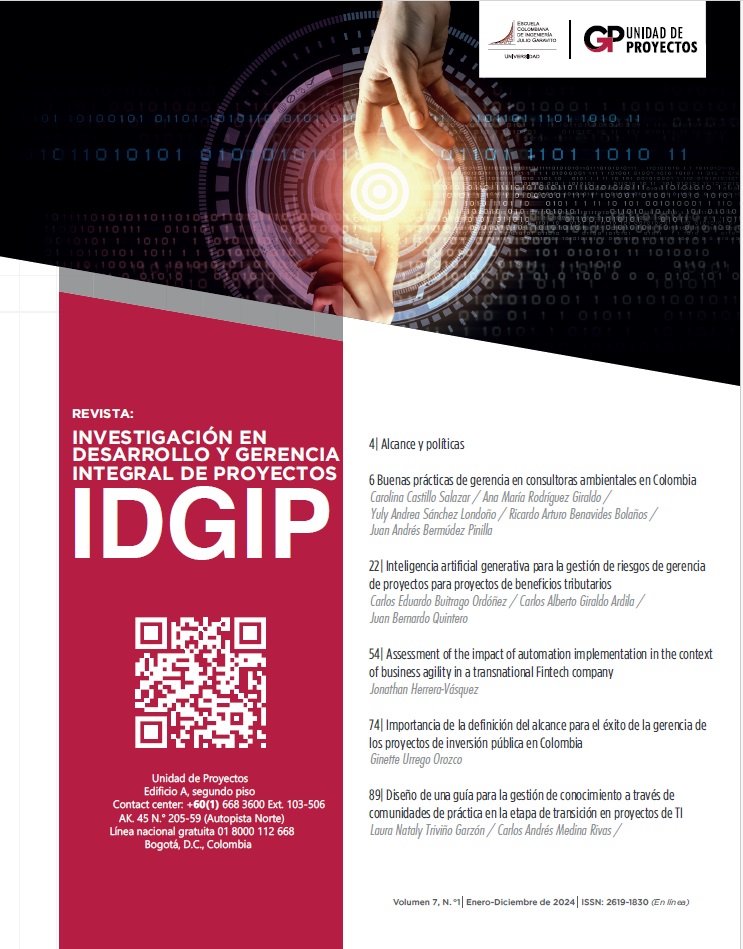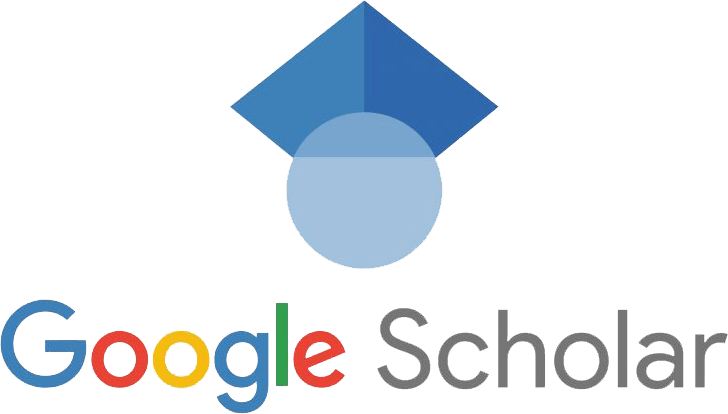Assessment of the impact of automation implementation in the context of business agility in a transnational Fintech company
DOI:
https://doi.org/10.46659/26191830.v1.n1.2024.215Palabras clave:
agilidad empresarial, Automatización , RPA (Automatización robótica de procesos) , transformación digital, Integración continua, Entrega continuaResumen
Business agility has been defined as the ability of organizations to quickly sense and respond to turbulent environmental changes, which may be caused by product delivery needs, market turmoil due to changing customer demands, or advances due to emerging technologies for digital transformation. This research aims to evaluate the impact of the implementation of automation processes in the context of organizational agility in a transnational Fintech with presence in Costa Rica. Planning and training of the highest-ranking leaders in the organization was conducted and a strategy was defined for the implementation of the agile model, work streams, tribes, squads, chapters, and guilds were established. Subsequently, opportunities for improvement and optimization were identified and priorities were defined according to the impact on savings. Of the 206 proposed improvements, 87 required automations in one of the following topics: RPA, test automation, continuous integration, scripting, or continuous delivery workflows. 23 automations were implemented, generating a total saving of 6,052 net work hours, which corresponds to 32 full-time associates. The reported improvements correspond to financial software development or implementation processes, which represent capitalizable hours of work, positively affecting the optimization of profit and efficiency of the organization. The implementation of an agile business model fostered the identification of improvement opportunities, and the optimization of deliverables and revenue was demonstrated. It is necessary to continue with the development of the model to achieve the full benefits and a stable level of maturity in the processes.
Descargas
Referencias
Akbar, M.A., Smolander, K., Mahmood, S., & Alsanad, A. (2022). Toward successful DevSecOps in software development organizations: A decision-making framework. Information and Software Technology, 147, 106894. https://doi.org/10.1016/j.infsof.2022.106894
Arslanian, H., Fischer, F., 2019. Fintech and the Future of the Financial Ecosystem. Future Finance, 201—214.
Arsawan, IWE, Hariyanti, NKD, Atmaja, IMADS, Suhartanto, D., & Koval, V. (2022). Developing Organizational Agility in SMEs: An Investigation of Innovation's Roles and Strategic Flexibility. Journal of Open Innovation: Technology, Market, and Complexity, 8(3), 149. https://doi.org/10.3390/joitmc8030149
Barroso, M., & Laborda, J. (2022). Digital transformation and the emergence of the Fintech sector: Systematic literature review. Digital Business , 2 (2), 100028. https://doi.org/10.1016/j.digbus.2022.100028
Bhat, JR, AlQahtani, S.A., & Nekovee, M. (2022). FinTech enablers, use cases, and role of future internet of things. Journal of King Saud University - Computer and Information Sciences. https://doi.org/10.1016/j.jksuci.2022.08.033
Brunton, F. (2019). Digital cash. Princeton: Princeton University Press.
Butler, T., 2020. What's Next in the Digital Transformation of Financial Industry. IT Professional, 29-33.
Butt, S., Khan, SUR, Hussain, S., & Wang, WL (2022). A conceptual model supporting decision-making for test automation in agile-based software development. Data & Knowledge Engineering, 102111. https://doi.org/10.1016/j.datak.2022.102111
Cai, C., Marrone, M., & Linnenluecke, M. (2022). Trends in FinTech Research and Practice: Examining the Intersection with the Information Systems Field. Communications of the Association for Information Systems, 50(1), 803–834. https://doi.org/10.17705/1cais.05036
Donald, D. C. (2020). Hong Kong's Fintech Automation: Economic Benefits and Social Risks. Regulating FinTech in Asia, 31–50. https://doi.org/10.1007/978-981-15-5819-1_3
Eilers, K., Peters, C., & Leimeister, J.M. (2022). Why the agile mindset matters. Technological Forecasting and Social Change, 179, 121650. https://doi.org/10.1016/j.techfore.2022.121650
Fayezi, S., O'Loughlin, A., Zutshi, A., Sohal, A., & Das, A. (2020). What impacts do behavior-based and buffer-based management mechanisms have on enterprise agility? Journal of Manufacturing Technology Management, 31(1), 169–192. https://doi.org/10.1108/JMTM-05-2018-0160
Gonçalves, D., Bergquist, M., Alänge, S., & Bunk, R. (2022). How Digital Tools Align with Organizational Agility and Strengthen Digital Innovation in Automotive Startups. Procedia Computer Science, 196, 107–116. https://doi.org/10.1016/j.procs.2021.11.079
Goswami, T.G., & Mansi. (2022). Defining and Practicing Organizational Agility. IUP Journal of Knowledge Management, 20(2), 7–21.
Gradim, B., & Teixeira, L. (2022). Robotic Process Automation as an enabler of Industry 4.0 to eliminate the eighth waste: a study on better usage of human talent. Procedia Computer Science, 204, 643–651. https://doi.org/10.1016/j.procs.2022.08.078
Gupta, P., & Tham, T. M. (2019). Fintech: The New DNA of Financial Services. Berlin, Germany: De Gruyter.
Hoda, R. (2019). Agile Processes in Software Engineering and Extreme Programming – Workshops: XP 2019 Workshops, Montréal, QC, Canada, May 21–25, 2019, Proceedings. . . in Business Information Processing, 364) (1st ed. 2019). Springer.
Hoonsopon, D., & Puriwat, W. (2021). Organizational Agility: Key to the Success of New Product Development. IEEE Transactions on Engineering Management, 68(6), 1722–1733. https://doi.org/10.1109/tem.2019.2929500
Jędrzejka, D. (2019). Robotic process automation and its impact on accounting. Zeszyty Teoretyczne Rachunkowości, 2019(105 (161)), 137–166. https://doi.org/10.5604/01.3001.0013.6061
Kaya CT, Turkyilmaz M., Birol B. (2019), Impact of RPA Technologies on Accounting Systems, “Journal of Accounting & Finance”, 82, pp. 235–249. https://doi.org/10.25095/mufad.536083
Kowalewski, O., & Pisany, P. (2022). The rise of fintech: A cross-country perspective. Technovation, 102642. https://doi.org/10.1016/j.technovation.2022.102642
Kumkale, İ. (2022). Organizational Mastery: The Impact of Strategic Leadership and Organizational Ambidexterity on Organizational Agility. New York, United States: Springer Publishing.
Liu, SF, Fan, YJ, Luh, DB, & Teng, PS (2022). Organizational Culture: The Key to Improving Service Management in Industry 4.0. Applied Sciences, 12(1), 437. https://doi.org/10.3390/app12010437
Luz, W.P., Pinto, G., & Bonifácio, R. (2019). Adopting DevOps in the real world: A theory, a model, and a case study. Journal of Systems and Software, 157, 110384. https://doi.org/10.1016/j.jss.2019.07.083
Miler, J., Gaida, P., 2019. On the agile mindset of an effective team – An industrial opinion survey. In: Proceedings of the Federated Conference on Computer Science and Information Systems, pp. 841–849.
Miller, S.C., & Kirkpatrick, S. (2021). The Government Leader's Field Guide to Organizational Agility: How to Navigate Complex and Turbulent Times. New York, United States: Macmillan Publishers.
Mordi, A., Schoop, M., 2020. Making it tangible: creating a definition of the agile mindset. In: Proceedings of the twenty-Eighth European Conference on Information Systems, Marrakesh, Morocco, pp. 1–17.
Murinde, V., Rizopoulos, E., & Zachariadis, M. (2022). The impact of the FinTech revolution on the future of banking: Opportunities and risks. International Review of Financial Analysis, 81, 102103. https://doi.org/10.1016/j.irfa.2022.102103
Ozbayrac, G. (2022). Enterprise Agility: A Practical Guide to Agile Business Management (1st ed.). Auerbach Publications.
Ozkan, N., G¨ok, MS¸., K¨ose, B.¨O., 2020. Towards a better understanding of agile mindset by using principles of agile methods, in: Proceedings of the Federated Conference on Computer Science, pp. 721–730.
Plant, OH, van Hillegersberg, J., & Aldea, A. (2022). Rethinking IT governance: Designing a framework for mitigating risk and fostering internal control in a DevOps environment. International Journal of Accounting Information Systems, 45, 100560. https://doi.org/10.1016/j.accinf.2022.100560
Pedersen, N. (2020). Financial Technology: Case Studies in Fintech Innovation (1st ed.). Kogan Page.
Reinhardt, K. (2020). Digitale Transformation der Organization: Grundlagen, Praktiken und Praxisbeispiele der digitalen Unternehmensentwicklung. New York, United States: Springer Publishing.
Ridwandono, D., & Subriadi, A.P. (2019). IT and Organizational Agility: A Critical Literature Review. Procedia Computer Science, 161, 151–159. https://doi.org/10.1016/j.procs.2019.11.110
Salameh, A. & J. Bass. (2019). Spotify Tailoring for B2B Product Development. In 2019 45th Euromicro Conference on Software Engineering and Advanced Applications (SEAA). IEEE, Cham, 61–65.
Salameh, A., & Bass, J.M. (2020). Heterogeneous Tailoring Approach Using the Spotify Model. Proceedings of the Evaluation and Assessment in Software Engineering. https://doi.org/10.1145/3383219.3383251
Schindler, P. (2021). ISE Business Research Methods (14th ed.). McGraw-Hill Education.
Singh, R., Malik, G., & Jain, V. (2021). FinTech effect: measuring impact of FinTech adoption on banks' profitability. International Journal of Management Practice, 14(4), 411. https://doi.org/10.1504/ijmp.2021.116587
Sironi, P. (2021). Banks and Fintech on Platform Economies: Contextual and Conscious Banking (The Wiley Finance Series) (1st ed.). Wiley.
Syed, R., Suriadi, S., Adams, M., Bandara, W., Leemans, S.J., Ouyang, C., . . . Reijers, H. A. (2020). Robotic Process Automation: Contemporary themes and challenges. Computers in Industry , 115 , 103162. https://doi.org/10.1016/j.compind.2019.103162
Tortorella, GL, Pradhan, N., Macias de Anda, E., Trevino Martinez, S., Sawhney, R., & Kumar, M. (2020). Designing lean value streams in the fourth industrial revolution era: proposition of technology-integrated guidelines. International Journal of Production Research, 58(16), 5020–5033. https://doi.org/10.1080/00207543.2020.1743893
Tracy, S. J. (2019). Qualitative Research Methods: Collecting Evidence, Crafting Analysis, Communicating Impact. Wiley-Blackwell.
Tyagi, SKS, Boyang, Q., 2021, ''An Intelligent Internet of Things aided Financial Crisis Prediction Model in Fintecv IEEE Internet of Things Journal, pp. 1-11.
Verbaan, M., & Silvius, A.J.G. (2012). The Impact of IT Management Processes on Enterprise Agility. Communications of the IIMA, 12(1), 79–93.
Walter, A. T. (2020). Organizational agility: ill-defined and somewhat confusing? A systematic literature review and conceptualization. Management Review Quarterly, 71(2), 343–391. https://doi.org/10.1007/s11301-020-00186-6
Wiechmann, D.M., Reichstein, C., Haerting, R.C., Bueechl, J., & Pressl, M. (2022). Agile management to secure competitiveness in times of digital transformation in medium-sized businesses. Procedia Computer Science, 207, 2353–2363. https://doi.org/10.1016/j.procs.2022.09.294
Williams, O.C., & Olajide, F. (2020). A Technological Approach towards the Measurement of Enterprise Agility. CISTI (Iberian Conference on Information Systems & Technologies / Conferência Ibérica de Sistemas e Tecnologias de Informação) Proceedings, 1–4.
Wong, M. (2020). Corporate Agility: Insights on Agile Practices for Adaptive, Collaborative, Rapid, and Transparent Enterprises (1st ed.). Wiley.
Descargas
Publicado
Número
Sección
Licencia

La revista Investigación en Desarrollo y Gerencia Integral de Proyectos está licenciada bajo una Creative Commons Attribution, que permite a otros compartir el trabajo con un reconocimiento de la autoría y la publicación inicial en esta revista.
Los autores de los artículos seleccionados deberán autorizar su publiación en la Revista en Investigación en Desarrollo y Gerencia Integral de Proyectos, que se reserva el derecho a hacerlo en la versión final.








